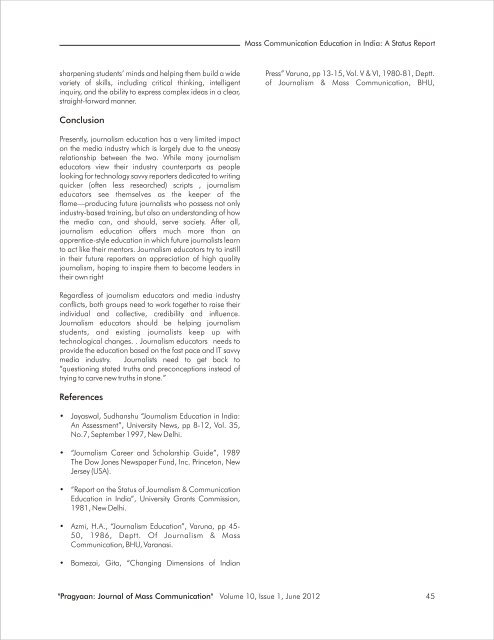Research Papers/Articles - Institute of Management Studies Dehradun
Research Papers/Articles - Institute of Management Studies Dehradun
Research Papers/Articles - Institute of Management Studies Dehradun
You also want an ePaper? Increase the reach of your titles
YUMPU automatically turns print PDFs into web optimized ePapers that Google loves.
sharpening students’ minds and helping them build a wide<br />
variety <strong>of</strong> skills, including critical thinking, intelligent<br />
inquiry, and the ability to express complex ideas in a clear,<br />
straight-forward manner.<br />
Conclusion<br />
Presently, journalism education has a very limited impact<br />
on the media industry which is largely due to the uneasy<br />
relationship between the two. While many journalism<br />
educators view their industry counterparts as people<br />
looking for technology savvy reporters dedicated to writing<br />
quicker (<strong>of</strong>ten less researched) scripts , journalism<br />
educators see themselves as the keeper <strong>of</strong> the<br />
flame—producing future journalists who possess not only<br />
industry-based training, but also an understanding <strong>of</strong> how<br />
the media can, and should, serve society. After all,<br />
journalism education <strong>of</strong>fers much more than an<br />
apprentice-style education in which future journalists learn<br />
to act like their mentors. Journalism educators try to instill<br />
in their future reporters an appreciation <strong>of</strong> high quality<br />
journalism, hoping to inspire them to become leaders in<br />
their own right<br />
Regardless <strong>of</strong> journalism educators and media industry<br />
conflicts, both groups need to work together to raise their<br />
individual and collective, credibility and influence.<br />
Journalism educators should be helping journalism<br />
students, and existing journalists keep up with<br />
technological changes. . Journalism educators needs to<br />
provide the education based on the fast pace and IT savvy<br />
media industry. Journalists need to get back to<br />
“questioning stated truths and preconceptions instead <strong>of</strong><br />
trying to carve new truths in stone.”<br />
References<br />
• Jayaswal, Sudhanshu “Journalism Education in India:<br />
An Assessment”, University News, pp 8-12, Vol. 35,<br />
No.7, September 1997, New Delhi.<br />
• “Journalism Career and Scholarship Guide”, 1989<br />
The Dow Jones Newspaper Fund, Inc. Princeton, New<br />
Jersey (USA).<br />
• “Report on the Status <strong>of</strong> Journalism & Communication<br />
Education in India”, University Grants Commission,<br />
1981, New Delhi.<br />
• Azmi, H.A., “Journalism Education”, Varuna, pp 45-<br />
50, 1986, Deptt. Of Journalism & Mass<br />
Communication, BHU, Varanasi.<br />
• Bamezai, Gita, “Changing Dimensions <strong>of</strong> Indian<br />
Mass Communication Education in India: A Status Report<br />
Press” Varuna, pp 13-15, Vol. V & VI, 1980-81, Deptt.<br />
<strong>of</strong> Journalism & Mass Communication, BHU,<br />
"Pragyaan: Journal <strong>of</strong> Mass Communication" Volume 10, Issue 1, June 2012 45


